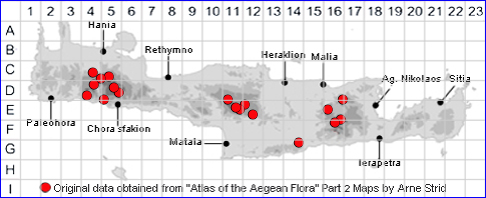
MYOSOTIS REFRACTA subsp. REFRACTA
Family and Genus:- See- BORAGINACEAE
Common Names:- None
Homotypic Synonyms:- None
Meaning:- Myosotis (Gr) Mouse-ear, A name used by the Greek physician and
botanist Dioscorides.
Refracta (L) Abruptly bent backwards, broken(-looking).
General description:- Slender annual, often branched from the base.
Stem:-
1) Up to 25 cm, often shorter, usually rigidly erect, leafy up to the lowest flowers,
patent, lanate, above, and hooked hairs below.
Leaves:-
1) 4 x 1 cm, narrowly to rather broadly lanceolate, rarely ovate, lower surface with
hooked hairs.
Flowers:-
1) Inflorescence, long, slender,± 1-sided, lax below, crowded above.
a) pedicels, scarcely more than 1 mm in fruit, almost always deflexed at
maturity.
2) Calyx, up to 4·5 mm in fruit, usually not appressed when deflexed in fruit.
divided to c. 1/3, open, deciduous.
a) tube, more or less evenly covered with deflexed hooked hairs.
3) Corolla:
a) limb, up to 1·5 mm diam. flat, or rather smaller and saucer-shaped, pale to
bright blue.
Fruit:-
1) Nutlets, 1.5 x 2 mm, broadest at or below the middle, with a furrow in the middle.
with a small, lateral attachment-area, a distinct rim and, on the inner side,
brown.
Key features:-
1) Lower surface of the leaves, especially on the veins, and base of the stem with
hooked hairs.
2) Inflorescence-axis, with some upwardly projecting or patent hairs.
3) Calyx, divided to 1/3 in fruit.
4) More or less evenly covered with deflexed hooked hairs.
5) Nutlets, narrowly ellipsoid.
Habitat:- Rock ledges, screes and dolines, generally on limestone (100-)500-2300
m.
Distribution:- Scattered throughout mainland Greece, Aegean and Mediterranean.
On Crete confined to the three main Massifs.
Flowering time:- Apr-June
Photos by:- Fotis Samaritakis
SPECIES DESCRIPTION
